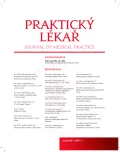-
Medical journals
- Career
Health literacy of the Romany minority in the Czech Republic
Authors: L. Rolantová 1; A. Kajanová 2; J. Maňhalová 1
Authors‘ workplace: Jihočeská univerzita v Českých Budějovicích, Zdravotně sociální fakulta, Ústav ošetřovatelství, porodní asistence a neodkladné péče, Ředitelka: doc. PhDr. Sylva Bártlová, Ph. D. 1; Jihočeská univerzita v Českých Budějovicích, Zdravotně sociální fakulta Ústav sociálních a sociálněpedagogických věd, Ředitelka: doc. PhDr. Adéla Mojžíšová, Ph. D. 2
Published in: Prakt. Lék. 2019; 99(1): 33-36
Category: Of different specialties
Overview
Aim:
The goal of the study was to assess the health and the use of healthcare in association with health literacy in the Romany minority living in the Czech Republic.
Method:
The quantitative study was performed using the brief form of the HLS-EU-Q16 questionnaire used for the identification of the population’s health literacy. The sample consisted of 300 Romany subjects.
Results:
The results show that inadequate or marginal health literacy prevails in the Romany population. Most of the respondents suffer from one or multiple chronic diseases. A significant correlation was proven between health literacy and health of the Romany – the worse the health the lower health literacy. No correlations between health literacy and sex or age were proven. On the other hand, the correlation between health literacy and the fact whether the respondent can afford the visit to the doctor proved to be statistically significant.
Conclusion:
The study results confirmed the conclusions of a number of international studies, which draw the attention to very low health literacy associated with poor health of the Romany population. Prevention and a healthy lifestyle need to be focused on, as well as the Romany’s ability to understand the healthcare system.
Keywords:
the Romany minority – health literacy – health – prevention – healthcare
Sources
1. Vivian C, Dundes L. The crossroads of culture and health among the Roma (Gypsies). J Nurs Scholarsh 2004; 36(1): 86–91.
2. Gecková MA, Babinská I, Bobáková D, et al. Socioeconomic characteristics of the population living in Roma settlements and their association with health and health-related behaviour. Cent Eur J Public Health 2014; 22(Suppl): S57–64.
3. Holčík J. Systém péče o zdraví a zdravotní gramotnost: K teoretickým základům cesty ke zdraví. Brno: Masarykova univerzita 2010.
4. Holčík J. Zdravotní gramotnost a její role v péči o zdraví: K teoretickým základům cesty ke zdraví. Brno: MSD 2009.
5. WHO. Interim Second Report on Social Determinants of Health and the Health Divide in the WHO – European Region [online] 2011. Dostupné z: http://www.euro.who.int/_data/assets/pdf_file/0010/148375/id5E_2ndRepSocialDet-jh.pdf [cit. 2018-12-09].
6. Ivanová K, Špidurová L., Kutnohorská J. Multikulturní ošetřovatelství I. Praha: Grada Publishing 2005.
7. Kašparová I. Význam nemoci, dožívání a smrti pro současný život Romů: sociálně-antropologická perspektiva. Urol pro praxi 2015; 16(2): 88–90.
8. Klíčová K. Životní podmínky Romů v České republice v mezinárodním srovnání v kontextu rizik etnického významu. In: Sirovátka T. Sociální exkluze a sociální inkluze menšin a marginalizovaných skupin. Brno: Masarykova univerzita 2004.
9. Kučera Z. Zdravotní gramotnost české populace: Výsledky reprezentativního šetření [online]. Dostupný z: http://www.szu.cz/uploads/documents/czzp/Efektivni_strategie_podpory_zdravi_18062015/Zdravotni_gramotnost_ceske_populace_Vysledky_reprezentativniho_setreni.pdf [cit. 2018-12-09].
10. Marcincin A, Marcincinova L. The cost of non-inclusion: the key to integration respect for diversity. Bratislava: Open Society Foundation 2009.
11. Osborne H. Health literacy from A to Z: Practical ways to communicate your health message. Burlington, MA: Jones & Bartlett Learning 2013.
12. Příručka pro jednání s romskou komunitou v oblasti zdravotních služeb. Madrid: Fundación Secretariado Gitano 2007 [online]. Dostupné z: http://ec.europa.eu/health/ph_projects/2004/action3/docs/2004_3_01_manuals_cs.pdf [cit. 2018-12-09].
13. Ptáček R, Bartůněk P, a kol. Etika a komunikace v medicíně. Praha: Grada Publishing 2011.
14. Růžička M. Časoprostorové a infrastrukturní aspekty procesu sociální exkluze. Sociologický časopis/Czech Sociological Review 2011; 47(2): 273–295.
15. Sepkowitz KA. Health of the world’s Roma population. Lancet 2006; 367(9524): 1707–1708.
16. Šlechtová D, Bürgerová O. Specifika romského etnika ve vztahu k poskytování zdravotní a ošetřovatelské péče. Kontakt 2009; 1 : 187–192.
17. Yamashita T, Kunkel SR. An international comparison of the association among literacy, education, and health across the United States, Canada, Switzerland, Italy, Norway and Bermuda: implications for health disparities. J Health Commun 2015; 20(4): 406–415.
18. Parlament České republiky. Zákon č. 48/1997 Sb., o veřejném zdravotním pojištění a o změně a doplnění některých souvisejících zákonů [online]. Dostupné z: https://www.zakonyprolidi.cz/cs/1997-48 [cit. 2018-12-09].
19. Ministerstvo zdravotnictví České republiky. Zdraví 2020 – Národní strategie ochrany a podpory zdraví a prevence nemocí [online]. Dostupné z: https://www.mzcr.cz/Verejne/dokumenty/zdravi-2020-narodni-strategie-ochrany-a-podpory-zdravi-a-prevence-nemoci_8690_3016_5.html [cit. 2018-12-09].
20. Zeman CL, Depken DE, Senchina DS. Roma health issues: a review of the literature and discussion. Ethnic Health 2003; 8(3): 223–250.
Labels
General practitioner for children and adolescents General practitioner for adults
Article was published inGeneral Practitioner

2019 Issue 1-
All articles in this issue
- Život s Crohnem – pohled z kožní ordinace + autentické sdělení pacientky
- Chirurgie a tělocvik
- Odešel nestor olomouckého tělovýchovného lékařství: prof. MUDr. Zdeněk Jirka, CSc. (1928–2018)
- Epidemie chytrých telefonů Nebezpečí pro zdraví, vzdělání a společnost
- Proton radiation therapy in the treatment of solid tumours
- The workload of general paediatricians in Czechia as viewed by the physicians themselves
- Chronic stress as a risk factor for the incidence and progression of cancer?
- Personal dignity of a patient with multiple sclerosis: interpretative phenomenological analysis
- Attitude of doctors and managers of outpatient healthcare facilities on received complaints
- Health literacy of the Romany minority in the Czech Republic
- General Practitioner
- Journal archive
- Current issue
- Online only
- About the journal
Most read in this issue- Chronic stress as a risk factor for the incidence and progression of cancer?
- Proton radiation therapy in the treatment of solid tumours
- Personal dignity of a patient with multiple sclerosis: interpretative phenomenological analysis
- Health literacy of the Romany minority in the Czech Republic
Login#ADS_BOTTOM_SCRIPTS#Forgotten passwordEnter the email address that you registered with. We will send you instructions on how to set a new password.
- Career

